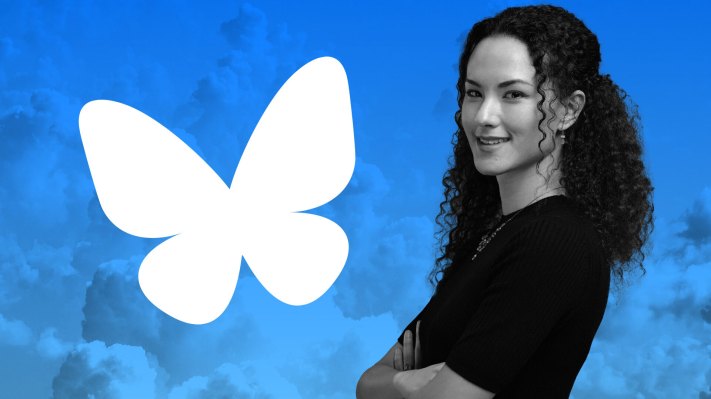Meta is in hot water after announcing plans to remove politics from its recommendations across Instagram and Threads, its new Twitter-like app for text-based posts. That leaves a window of opportunity for the startup Bluesky, whose CEO Jay Graber recently explained that Meta’s decision is emblematic of the types of problems that could emerge when you have “one algorithm run by one company,” and how Bluesky’s app is different.
“It’s sort of a black box, the company can do whatever they want, and users don’t really have a choice,” Graber said in response to a question about Meta’s censoring of politics during an interview on the Techmeme Ride Home podcast. “The goal of building in algorithmic choice at the start with Bluesky was so that you can always choose what kind of feed you’re going to get. You can control your scroll,” she added.
On Bluesky, Graber said, users could choose to have a highly political social experience, by following politically themed custom feeds and trending topics, or they could choose to filter out politics entirely.
“Two people using the same Bluesky app could — one be having a very cozy, quiet experience, no politics, just seeing their friends’ posts and maybe like, pictures of moss and cats,” Graber suggested. “And then somebody else could be following trending topics, Super Bowl discourse, politics, whatever is going on.”
Or, as Graber herself does, they could switch back and forth between different modes, based on what it was they wanted to see at the time.
Unlike with centralized platforms, like the Meta-operated Facebook, Instagram, and Threads, or even the Elon Musk–run X (formerly Twitter), Bluesky presents a different approach to social media. It’s more like the open source Twitter competitor Mastodon, in that it will also offer a decentralized social networking service, albeit one powered by a different networking protocol — the AT Protocol, instead of ActivityPub, which Mastodon integrates with.
Although Threads, too, plans to integrate with ActivityPub, Meta’s moderation decisions will ultimately apply to everyone using Threads, even if it becomes one node on the larger federated network that includes Mastodon and other ActivityPub-powered apps. And at over 130 million monthly active users as of Meta’s fourth quarter, Threads would dwarf the rest of Mastodon, which currently has around 1 million monthly active users, its website says.
Bluesky, meanwhile, is already bigger than Mastodon, having nearly doubled its user base since opening its doors to the public last week. The app today is closing in on 5 million users (it’s at 4.86 million, currently) and is working to enable federation later this month, the company earlier said.
But its bigger draw to users may not be which protocols it uses for social networking, but the ease with which users can customize their experience — something that’s more lacking on Mastodon, which has struggled with usability. Up until its September release, for instance, Mastodon users couldn’t even search for posts; they had to rely on hashtags.
Bluesky aims to offer hashtags, too, Graber said. “It actually is on its way,” she said in the interview, referring to hashtags’ introduction.
But on Bluesky, hashtags won’t be just a way to surface terms and trends; they can also power custom feeds, the CEO noted. Thanks to Bluesky’s API, developers have built custom tools, like SkyFeed, that let anyone — even non-developers — build their own feeds using a graphical user interface.
“You can start building custom feeds that do things — based off lists, based off hashtags, based off words, based off regular expressions, based off machine learning,” said Graber. “And these tools are getting better and better and creating more options for people who want to be creative, have an idea for a feed, but don’t know how to code.”
As election season nears, the promise of customized, personalized social media could appeal to a cohort of users who want a Twitter alternative — X is going in a different direction involving payments, shopping, and creator content — but one where the rules aren’t dictated by one person, or, in the case of Meta, created in fear of punishment by lawmakers and regulators.
